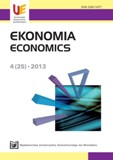Ocena skuteczności wspólnej polityki rybołówstwa Unii Europejskiej w kontekście problemu przełowienia. Perspektywa instytucjonalna
The evaluation of the effectiveness of the common fisheries policy of the European Union in the context of the overfishing problem. An institutional p
Author(s): Rafał M. JakubowskiSubject(s): Economy
Published by: Wydawnictwo Uniwersytetu Ekonomicznego we Wrocławiu
Keywords: collapse of fisheries; EU fishing policy; efficiency; transferable fishing quotas
Summary/Abstract: In 1968 in the magazine “Science” a biologist G. Hardin presented the problem of “the tragedy of commons” in relation to the over-exploitation of natural goods [Hardin, p. 162], as a result of which a substantial part of them could be irrevocably destroyed. This article discusses these issues on the example of more and more frequent collapses of European marine fisheries. The Common Fisheries Policy (CFP) has been carried out by the European Union basically since the 70s of the twentieth century. The main objective of the CFP is providing long-term sustainable fishing and hence preventing the collapse of European fisheries. So far the CFP has been mainly based on setting catch limits − so called TACs − and then allocating TACs to the particular EU member states. The purpose of this article is to formulate answers to the two following questions: 1. Is the current CFP (as well as the adopted institutional arrangements) adequately matched, ie. does it effectively counteract the problem of overfishing? 2. If not, what solutions can increase the efficiency of management of marine fish resources, through eliminating (or at least delaying) the problem of more and more common collapse of European fisheries? The first part of this article presents some predictions derived from the neoclassical theory of public goods. In this part there are explanations of the mechanism of overfishing as a result of the lack of adequate incentives to reduce fishing. Afterwards, the Common Fisheries Policy of EU (and its subsequent reforms) is analyzed in more detail. In particular, the highly technocratic nature of this policy is shown. In addition, the ineffectiveness of the CFP (in its present form) is demonstrated, as evidenced by the following data: •• approximately 88% of fish stocks in European waters are overfished (the world average is around 25%) and about 30% of them have exceeded the level enabling the rebirth of stocks (so they are practically run-down); •• the majority of EU fishing fleets is too big (it is estimated that in some cases up to 80%) and unprofitable or operates at breakeven. The EU fleets overcapacity is driving overfishing. The last part of the work shows the meta-analysis of 11.135 commercial fisheries worldwide [Costello et al. 2008]. This analysis gives empirical evidence that more effective solution would be to introduce individual transferable quotas (ITQs) as a basic tool of fisheries management systems. In the conclusions these assertions are supported by the selected practical experiences from European fisheries. These experiences also show that the implementation of ITQs reduces the size of the fishing fleets, increases their profitability, reduces the problem of overfishing and thus more effectively prevents the collapse of fisheries. The paper concludes that the inefficiency of the CFP results from: •• technocratic central planning system, which is vulnerable to lobbying and to the implementation of particularistic interes
Journal: Ekonomia
- Issue Year: 2013
- Issue No: 25
- Page Range: 151-165
- Page Count: 15
- Language: Polish

